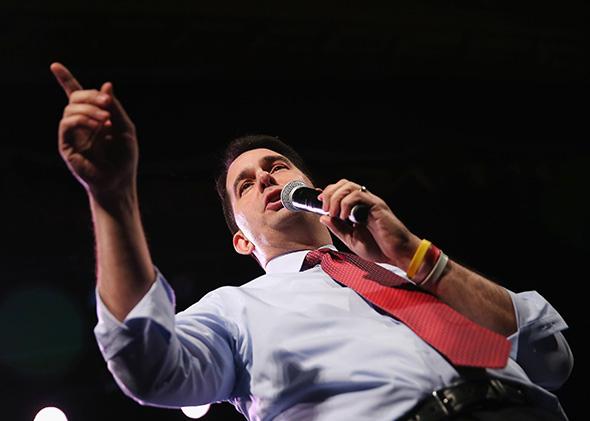Scott Walker is having a moment. After speaking at an event for conservative activists in Iowa last month, he’s been riding high. The event featured nearly every potential Republican 2016 contender, and the general consensus was that the Wisconsin governor won the day. In fact, he came out on top in a Des Moines Register poll of likely Iowa Republican caucus-goers released Sunday, and Matt Drudge has dubbed him the “clear frontrunner” based on an unscientific poll of readers. In Walker World, things are looking good.
Part of the reason he’s risen so quickly is that he’s been able to tout his executive experience. But this approach brings unique vulnerabilities, and some conservative activists in Iowa are starting to express doubts about whether Walker’s gubernatorial record is as conservative as it sounds. That Des Moines Register poll may offer a little insight: Walker was the No. 2 choice for those looking for an establishment nominee and for those looking for an anti-establishment one.
“He’s in a sweet spot,” pollster J. Ann Selzer told the paper. “People who don’t want an ultra-conservative think he’s OK. People who don’t want a moderate think he’s OK.”
So at the moment, Walker is all things to all men. That may not last. On two of the issues nearest and dearest to the conservative base, Walker’s positions are a little blurry. His record shows there could be openings for primary contenders running to his right—think Sens. Rand Paul and Ted Cruz—to try to peg him as a squishy RINO–surrender-caucus member.
Immigration is the first potential problem area. In a 2013 interview with the Daily Herald Media editorial board of Wisconsin (which Daniel Strauss wrote up for the Hill here), Walker said he was comfortable with immigration reform that would provide a pathway to citizenship for undocumented immigrants.
“I think it makes sense,” he said.
Cue the red flags. Walker has repeatedly said he opposes amnesty for undocumented immigrants (he noted as much on Sunday on ABC’s This Week), but as we’ve discussed here before, the definition of “amnesty” can vary widely from Republican to Republican. As a result, immigration hardliners on the right are often unforgiving of anyone perceived as soft on the issue.
“Anybody who is arguing right now about what’s best for the people breaking the law, as opposed to what’s best for the people obeying it, is going to lose,” said Steve Deace, a conservative Iowa radio talk show host. (On Deace’s website Monday, Todd Erzen told conservatives, “Slow your roll.”) “That sends a signal to conservatives you probably don’t want to send if you’re running for president.”
The Common Core education standards could be another challenge for the governor. Their implementation has drawn passionate criticism from many conservative grass-roots and Tea Party activists around the country, and the Republican 2016 contenders—with the glaring exceptions of former Florida Gov. Jeb Bush and New Jersey Gov. Chris Christie—have fallen all over each other to denounce them. Walker has also been a vocal opponent of the standards, and made the case for their repeal during his 2014 re-election bid. But since then, some on the right argue he’s going soft. The Blaze, a news site that’s part of Glenn Beck’s media empire and that has substantial sway among grass-roots conservatives, ran a December headline that blared “Scott Walker Is Dialing Back His Common Core Opposition.” That story reported that the governor had shifted his stance on the issue, favoring legislation that would let school districts decide to opt out instead of a tougher move to get rid of the standards. But on Jan. 17, Fox 11 reported that he reiterated his wholesale opposition to the standards.
Shane Vander Hart, an Iowa organizer and activist who opposes the standards, said the jury is still out on whether Walker’s stance on the issue is acceptable.
“Iowa voters care about action,” he said. “If he says repeal but signs into law a bill that accomplishes nothing to get rid of Common Core in his state, that’s going to hurt him.”
Conservative opponents of Common Core are no small constituency. A recent Bloomberg Politics/Des Moines Register poll showed that just 32 percent of likely Republican caucus-goers had no problem with Jeb Bush’s stance on Common Core. That means it’s an important issue to conservatives in the state, and it means that if Walker doesn’t deliver, he could have some explaining to do. In this sense, Walker’s greatest asset—his executive experience—could also become a significant vulnerability.
“I think he has a rather unique challenge in that there’s a level of expectation for him that there may not be for some other people, because he actually has a trophy on his mantle,” said Deace, referring to Walker’s success in implementing legislation that cracked down on public sector unions. Walker’s greatest advantage is probably that he’s seen as a lawmaker willing to take on “big-government special interests” (a phrase he uses often) and fight for conservative policy priorities. If he doesn’t break out that same fighting spirit for other issues conservatives care about, it could be a problem.
“If he doesn’t do that on issues of Common Core and amnesty, people think, ‘it’s not because he can’t; it’s because he won’t,’ ” said Deace.
The coming months will give Walker plenty of opportunities to put to bed conservative concerns about what he will and won’t do.
